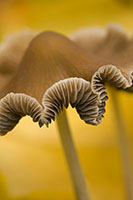
|
|
|||||
|
Featured Photographer, July 2010: David Cobb
This month, our featured guest is professional photographer, David Cobb. He is a member of NANPA (North American Nature Photography Association), PPA (Professional Photographers of America), and GWA (Garden Writers Association), and lives in the beautiful Pacific Northwest. He describes his photographs as "an extension of the connection I feel with the outdoors and the wilderness, and they reflect my deep respect for nature and the fragility of the environment." We want to thank David for taking the time to answer our questions, and share some of his insights with us! Please visit his site links to see more of his fantastic work, and to let him know you enjoyed his interview. :: How did you get your start in photography? :: My first camera was a James Bond spy camera imbedded into a briefcase that turned into a machine gun - that broke in two weeks. My real interest in photography began by documenting backpacking trips I'd take during the year. I trained my eye over the years on 5 month thru-hikes of the Pacific Crest and Continental Divide trails, and then a 1,000 mile walk along the Canadian Rockies. These were all documented with my trusty point-and-shoot.
:: You do a lot of nature photography that most landscape or wildlife photographers miss, like gardens, mushrooms, etc. How did you get into subjects like these? :: When I began photography, my early eye was easily attracted to color, which meant wildflowers along the trail. When I returned home, it was an easy extension to photograph color in the garden. This has all led to garden photography clients and images being published in magazines like "American Gardener," "Organic Gardening," and "Nature's Best Photography." As far as the mushrooms go, they're the flowers of the fall and make incredibly interesting subjects.
:: Are there similarities with subjects like these as opposed to heading out to a larger landscape scenario? :: There are. Everything of interest in a photograph either has light, color, form, or expression. All of those things exist in the garden, and that's what I try to capture. I try not to document the thing I photograph, but I try and capture what I like and feel about my subject - hopefully that is conveyed to the viewer.
:: Family and photography are hard to mix sometimes; how have you been able to juggle the combo? :: My wife is incredibly supportive of my photography and I thank her so much for that. Every once in a while she'll say, "You know this is a vacation, not a photo trip." It's good to get those reminders, and it's good to just put the camera down and just experience a sunset without looking through glass.
:: Is anyone else in the family interested in photography? :: My step-son loves photography, especially the urban landscape.
:: You've done some incredible long distance hiking. How do you photograph something like this, where pack weight and the ability to endure the trek is a primary concern over photography? :: I must make a decision beforehand if my trip is about photography or long-distance hiking; I haven't been able to combine the two. I'm currently planning a hike along the spine of South Korea, and plan to do both - this will be difficult.
:: Are you able to put photography on another level where it's more about documentation rather than creating a series of artistic images? :: I can. Sometimes my first flower image is a document, so I can indentify it later while key wording into the Metadata files. Sometimes after the good light dies out, I switch into the stock photography mode and shoot away.
:: What was your scariest or worst day photographing? :: I was on a cross-county section of "trail" north of Kakwa Provincial Park in Canada. There was almost no forward progress being made due to the alder thickets, and the best area of travel was through a forest of Devils Club (think head-high stinging nettle). The day was still, hot, humid, massively buggy, and we were lost. I thought of Marty Feldman in "Young Frankenstein" when he said, "Well, things could be worse, it could be raining." Then it started raining. I snapped a few images, but none were worth a damn. This is my worst day hiking and my worst day photographing - and I've had some doozies.
:: You've got a great mind for locations and when it's the best time to photograph them. How much research do you put in at home finding this information? :: I put in a lot of research before going into a location; the tides, sunset-sunrise, and moon are givens, but I might also look into rare plants of the area, interesting geological features, historical buildings, etc. Again, my long-distance hiking has played a part, because I might have walked through the area before and know it intimately well. Of course, looking at images online can also help.
:: What piece of advice would you give to someone just starting into photography? :: Learn how to run a business first, the photography will come more naturally. |
Photographer Spotlight Interviews
|
|
 |
Other Cool Stuff→ Past Workshop Photos → 72dpi.com → How-To Articles → Photographer of the Month |
 |
Contact Us→ Contact Us → About Us → Site Map |
© 2009-2024 Aperture Academy, Inc.









